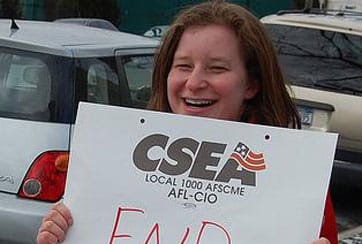
 NEW YORK (WOMENSENEWS)–Today marks the 100th anniversary of the Triangle Shirtwaist Factory fire, which stole the innocent lives of 146 workers in New York’s garment industry, most of them young, female and recent immigrants.
NEW YORK (WOMENSENEWS)–Today marks the 100th anniversary of the Triangle Shirtwaist Factory fire, which stole the innocent lives of 146 workers in New York’s garment industry, most of them young, female and recent immigrants.
The gross violation of basic human safety at the factory–the workers were locked in a room and unable to flee–was a turning point for workers and governmental entities.
From the ashes of the fire rose a labor movement fighting for one common cause: to improve the lives of working people. Labor organizations led an effort to force policy makers to establish the New York State Department of Labor. At the same time, employees were realizing the benefits of labor representation and forming and joining unions. Both the Department of Labor and the tradition of commitment to unionization in New York helps keep workers safe on the job to this day.
This event haunts and inspires my work as legislative director of the Assembly’s subcommittee on workplace safety, chaired by Assemblyman Rory Lancman.
But a century after the Triangle Shirtwaist Factory fire, hazardous working conditions, especially for immigrant and minority women, are all too easy to find. For instance, women working in nail salons are surrounded by toxic chemicals, often six or seven days a week, while women working in homecare services are threatened by violence as they enter unfamiliar homes.
In 2009, the percentage of female workers experiencing injuries resulting in days away from work increased from 37 to 39 percent, while the proportion of women in the work force stayed the same, according to the federal Bureau of Labor Statistics.
To counter these growing injury statistics, the subcommittee on workplace safety is working closely with labor representatives.
Safe Patient Handling Act
The Fire that Ignited a Movement of Women Workers from Onus Probandi on Vimeo.
A major initiative of ours to improve working conditions for all workers, but notably female workers, is our effort to pass the Safe Patient Handling Act (A.1370/S.2470). The act would institute a safe-patient handling policy in all health care facilities in New York State.
The health care industry is heavily staffed by women, who nationally make up 92 percent of registered nurses. These health care workers are especially prone to musculoskeletal disorders caused by repetitive and improper lifting motions while maneuvering patients.
The rate at which health care employees suffer injuries due to overextension is consistently higher than the average rate of injuries caused by overextension in all industries, according to data from the New York State Workers Compensation Board.
Nursing and residential-care facilities, for example, have exhibited rates that are between 5 and 8 percent higher than total industry claims since 2006.
Safe-patient handling programs provide employees with equipment and training to lift and maneuver patients without causing harm to the patients or themselves. Such programs have been applied in several health care facilities throughout the state and the country and have helped reduce injuries for both patients and their caregivers. The subcommittee is working tirelessly to pass this important legislation this spring.
If we can, it will be another way to honor the memory of the women who worked and died in the garment district 100 years ago.
Would you like to Comment but not sure how? Visit our help page at https://womensenews.org/help-making-comments-womens-enews-stories.
Would you like to Send Along a Link of This Story?
https://womensenews.org/story/labor/110324/shirtwaist-fire-leaves-work-hazards-smoldering
Allison Weingarten is legislative director of the New York State Assembly’s subcommittee on workplace safety, chaired by Assemblyman Rory Lancman.


